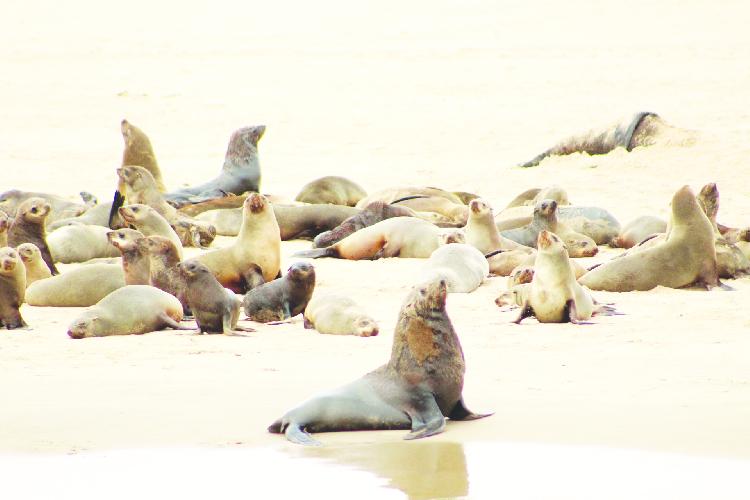Africa-Press – Namibia. BOTH the fisheries and environment ministries have expressed concern over the large population of seals, estimated to be about 1,4 million. Environment minister Pohamba Shifeta encouraged the fisheries ministry to offer more seal quotas, during a media tour to the Cape Cross seal reserve yesterday morning.
“They complain when we cull the seals but they don’t understand that the seals are too many. They finish the fish. More than what we catch.
“The pups consume more than 12kg of fish per day and the bulls up to 20kg depending on their weight,” he said.
Fisheries minister Derek Klazen also expressed concern about the negative impact large seal populations have on fish stocks, adding that harvesting, processing and selling seal products are very challenging.
“It appears that bulls are the more preferred products, while the quota has more pups. I am informed that the pups are not [as] economically feasible as the bulls,” he said. Klazen also referred to the immense pressure Namibia faces from international environmentalist groups with regards to seal culling.
“Seal harvesting has become an international tool used particularly by environmentalist groups to restrict the trade of fish and fisheries products originating from countries that harvest seals,” he said.
The Namibia Chamber of Environment, however, refutes concerns over the effect of growing seal populations on fish stocks in the country, with CEO Chris Brown saying there’s no scientific evidence to back up these claims.
“The fur seal diet is regulated in a bottom-up way, not top-down. This means they consume what is most readily available and don’t target any species in particular. When a species becomes rare, it virtually disappears from the fur seal diet.”
He says when sardine was abundant (pre-1970s) it was the mainstay of the fur seal diet, however, they have disappeared almost entirely after the collapse of the stock, mainly due to overfishing.
“It is now rarely recorded in the seal diet. They just use it when it is abundant, and their level of offtake was minute compared to the fishing industry.
Brown says overall, the bulk of the seal diet over the last few decades is made up of non-commercial species like bearded goby, which has increased since the disappearance of the sardine. He expressed concern that scientific evidence has been largely ignored by senior managers and some fisheries ministers over the years.
“Blaming fur seals or the environment is an easy way to deflect the attention away from poor stock management by the fisheries ministry and overfishing by the industry. The fishing industry is quick to put pressure on the ministry, Klazen has an opportunity now to change all this,” he said.
Brown emphasised that the fisheries ministry should reduce the influence of the fishing industry on fish stock for long-term sustainability, healthy fish stock and a healthy marine environment which would ensures economic activity for decades to come.
“The minister has a chance to start correcting the devastation and corruption of the past and make us all once again respect the marine fishing sector,” said Brown.
For More News And Analysis About Namibia Follow Africa-Press







How a stupid or misinformed minister can promulgate complete nonsense. Seal pups are on their mother’s milk for 10 to 11 months and consume NO fish. Adults consume 3 to 8 kilos daily. Not the 20 kilos the minister is claiming. And mostly fish not comercially desirable.